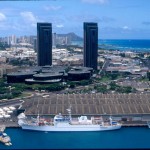What is a Foreign-Trade Zone?

A United States Foreign-Trade Zone is a secure, geographical area authorized by the federal government, where commercial merchandise, both domestic and foreign, receives the same treatment by US Customs as if it were outside the commerce of the United States. Many firms use FTZs to defer the payment of duties and taxes, and in the case of re-export of cargo, avoid the applicable duties and taxes all together as the merchandise was considered to have never entered the US consumption area.
FTZs can be operated by both public and private entities.
Merchandise of every description may be held in FTZs without being subject to Customs duties or other added value taxes. Importers, manufacturers, and distributors can realize cost-savings benefits because normally, when foreign cargo lands on US soil it is subject to clearance through Customs and requires immediate payment of US Customs duties. This tariff and tax relief is designed to lower the costs of US-based businesses engaged in international trade and thereby create and retain the employment and capital investment opportunities that result from those operations.
FTZs operate under the oversight and supervision of US Customs and Border Protection, as part of the United States Homeland Security Council. Even though FTZs are considered to be outside the Customs territory of the United States, they are on US soil. For that reason, goods and activities in FTZs are subject to federal, state and local laws and regulations. Articles prohibited by law are not allowed admission, nor are articles that violate copyright, trademark or patent laws. Animal quarantine restrictions apply as well. As long as the merchandise remains in an FTZ, it is not subject to US Customs laws governing the entry of goods into Customs territory or payment of duty on those goods.
There are two types of FTZs; general purpose zones and special purpose subzones. General purpose zones operate as public utilities providing a variety of services to many users. Special purpose subzones are single-use facilities which cannot be accommodated within the general purpose zone.
Resources:


